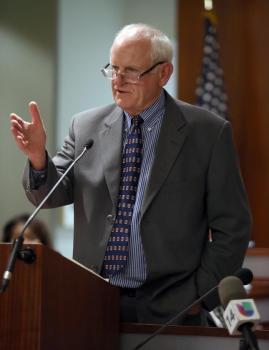|
| Click here for PowerPoint slides from last night’s State of the City presentation.
Richmond: Trimming budget, reducing homicides top mayor’s priority list
City’s pension and retiree healthcare obligations could require further cuts in services

Richmond has to trim expenses or find new sources of revenue by next year, says Richmond Mayor Tom Butt. (Jane Tyska/Bay Area News Group Archives)
By Karina Ioffee | kioffee@bayareanewsgroup.com |
PUBLISHED: February 28, 2017 at 9:04 pm | UPDATED: March 1, 2017 at 6:01 am
RICHMOND — Unless this city finds a way to increase revenues, it will have no choice but to cut services as early as next year, Mayor Tom Butt said Tuesday at his annual state of the city address.
There are multiple reasons for the increase, including growing pension and retiree health care costs, partly due to a lower projected rate of return on investments. That means Richmond and other communities will have to pay more each year to fund current and future pension benefits. According to CalPERS, the state retirement agency, retirement expenses could exceed $70 million in the next four years, making up 41% of the city’s general fund, a trend replicated in other cities.
An estimate by a financial consultant in fall 2015 determined that Richmond needs to shave approximately $15 million off its expenditures by 2021 to stay in the black. If not, it will likely have to cut jobs and reduce vital services such as libraries, recreational programs and street improvements. Last fall, this city of 110,000 looked to a real estate transfer tax for some salvation, but voters soundly rejected the proposal, sending the city looking for other sources of cash.
“If the city focused as much on collecting money as it does on spending money, we could increase revenues by millions each year, ” Butt said Tuesday night, an unusually blunt critique by a mayor who is typically quick to defend Richmond’s finances.
The city is focused on identifying new sources of revenue, including going after businesses operating without a license.
According to Mayor Butt’s estimate, as many as 2,000 businesses fall into the category, costing the city at least $1 million in revenues.
“Anecdotally, I’ve heard that we have hundreds of marijuana cultivation businesses but we’re permitted for only one,” Butt said.
New developments have also been slow to break ground, although the city says that numerous projects are in the pipeline.
In recent years, Richmond has become something of a food manufacturing hub, attracting companies like Blue Apron and Hello Fresh. New wineries and breweries have also opened in this former industrial city, including East Brother Brewing, Benoit Casper Brewing Company and Riggers Loft Winery. Warehouse vacancies are at just 2 percent.
Office vacancies are another matter, standing at nearly 20 percent, according to the mayor.
Besides the budget, Richmond has seen an increase in homicides. After a low of 11 killings in 2011, the homicide rate has steadily climbed, reaching 24 last year, three more than the year earlier. Most homicides are related to gang violence and 71 percent of shootings are of men ages 15 to 30 years old.
The upshot is that more homicides are being solved, according to Lt. Felix Tan, a police department spokesman.
On the housing front, Richmond is in the midst of setting up a Rent Board, part of its new rent control and just cause for eviction law, which went into effect Dec. 30. The law restricts rents from being increased by more than 2 percent of the consumer price index each year and bans landlords from evicting tenants without a valid cause. The law is being challenged in court by the California Apartment Association, which says it violates property owners’ constitutional rights. |
|

